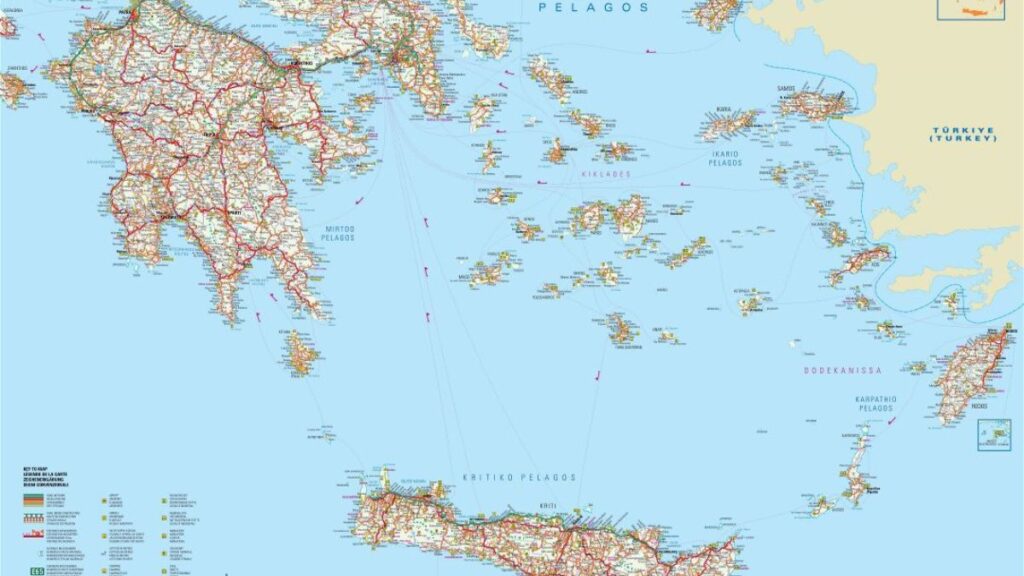Greece, a country where ancient history meets stunning Mediterranean landscapes [map:7rrcl11nwno= greece], stands as one of the world’s most fascinating destinations. This comprehensive guide will take you through everything you need to know about this remarkable nation, from its diverse geography to its rich cultural heritage.
Geographic Overview of Greece
Mainland Features
The Greek mainland occupies the southern tip of the Balkan Peninsula, featuring a dramatically varied landscape that has shaped the nation’s development. The country’s terrain includes:
- Mountain ranges covering 80% of the land
- The famous Mount Olympus, reaching 9,570 feet
- Extensive coastline stretching over 8,498 miles
- Numerous peninsulas and gulfs
Island Geography
Greece includes over 6,000 islands and islets, though only 227 are inhabited. Notable island groups include:
- The Cyclades, known for white-washed buildings
- The Dodecanese, near the Turkish coast
- The Ionian Islands, with their Venetian influence
- Crete, the largest Greek island
Historical Significance
Ancient Civilizations
Greece is often called the cradle of Western civilization, with good reason:
- Birthplace of democracy
- Home to influential philosophers
- Origin of the Olympic Games
- Development of classical architecture
Archaeological Treasures
The country boasts numerous UNESCO World Heritage sites, including:
- The Acropolis of Athens
- Ancient Delphi
- The Palace of Knossos
- Meteora monasteries
Modern Greece Today
Culture and Lifestyle
Modern Greek culture maintains strong connections to its ancient roots while embracing contemporary life:
- Strong family values
- Vibrant café culture
- Traditional festivals and celebrations
- World-renowned cuisine
Economy and Industry
Key sectors driving the Greek economy include:
- Tourism
- Shipping
- Agriculture
- Renewable energy
Major Destinations [map:7rrcl11nwno= greece]
Athens
The capital city offers:
- The iconic Parthenon
- Modern museums
- Vibrant neighborhoods
- Ancient marketplaces
Thessaloniki
Greece’s second-largest city features:
- Byzantine architecture
- Cultural festivals
- Modern art scene
- Historic waterfront
Island Destinations
Popular island destinations include:
- Santorini’s volcanic views
- Mykonos’ nightlife
- Rhodes’ medieval town
- Corfu’s British influence
Natural Wonders
Beaches
Greece’s coastline offers diverse beach experiences:
- Golden sand beaches
- Black volcanic beaches
- Hidden coves
- Crystal-clear waters
Mountains
The country’s mountainous regions provide:
- Hiking trails
- Ski resorts
- Traditional villages
- Unique ecosystems
Practical Travel Information
Best Times to Visit
- Spring (March to May): Mild weather, fewer crowds
- Summer (June to August): Peak season, warmest weather
- Fall (September to November): Pleasant temperatures, harvest festivals
- Winter (December to February): Skiing season, urban exploring
Transportation
Getting around Greece:
- Extensive ferry network
- Domestic flights
- Public buses
- Car rentals
Greek Cuisine
Traditional Dishes
Must-try Greek foods include:
- Moussaka
- Souvlaki
- Fresh seafood
- Greek salad
Wine and Spirits
Traditional beverages:
- Local wines
- Ouzo
- Tsipouro
- Metaxa
Cultural Customs and Etiquette
Social Norms
Important cultural considerations:
- Greeting customs
- Dining etiquette
- Religious respect
- Business practices
Frequently Asked Questions
What is the best time to visit Greece?
Spring and early fall offer ideal weather and fewer crowds compared to the peak summer season.
Do I need a visa to visit Greece?
US citizens can stay in Greece for up to 90 days without a visa as part of the Schengen Agreement.
What’s the currency in Greece?
Greece uses the Euro (€) as its official currency.
Is English widely spoken in Greece?
Yes, English is commonly spoken in tourist areas and major cities.
How do I get around the Greek islands?
The main options are ferries and domestic flights, with ferries being more common and economical.
What are the must-visit islands in Greece?
Santorini, Mykonos, Crete, and Rhodes are among the most popular islands, each offering unique experiences.
Is Greece expensive to visit?
Costs vary significantly by location and season, with islands and tourist areas being more expensive than mainland destinations.
What should I pack for a trip to Greece?
Comfortable walking shoes, sun protection, and modest clothing for visiting religious sites are essential.
Is Greece safe for tourists?
Greece is generally very safe for tourists, though normal precautions against petty theft should be taken in busy areas.
What are the best Greek foods to try?
Must-try dishes include moussaka, souvlaki, fresh seafood, Greek salad, and baklava.
Conclusion
Greece [map:7rrcl11nwno= greece] offers an unparalleled blend of history, culture, and natural beauty. Whether you’re interested in ancient ruins, beautiful beaches, mountain adventures, or culinary experiences, this Mediterranean gem provides countless opportunities for memorable experiences. Understanding its geography, culture, and practical travel considerations will help you make the most of your Greek adventure.
